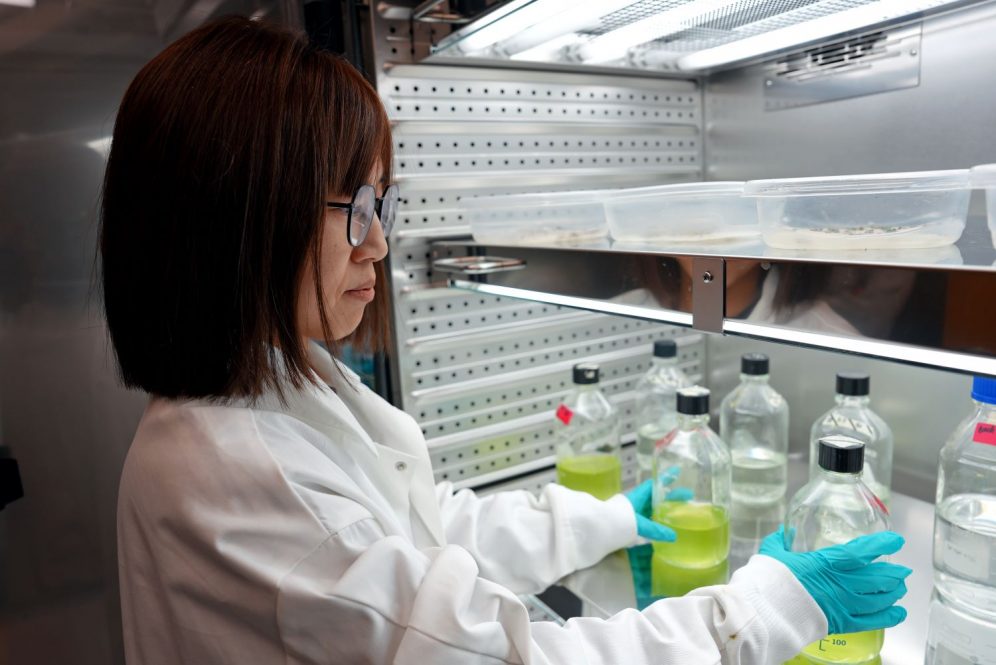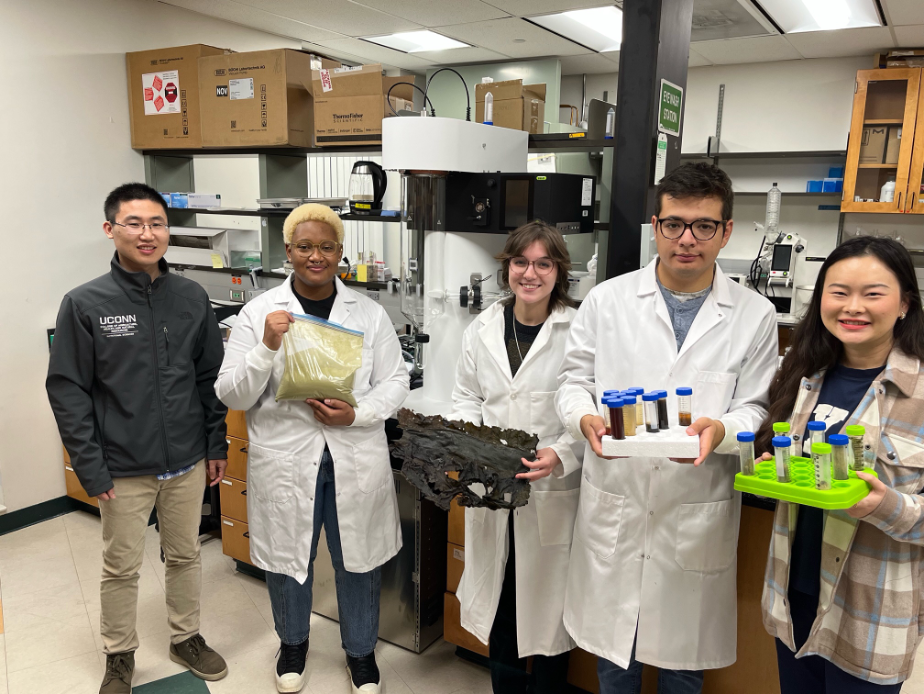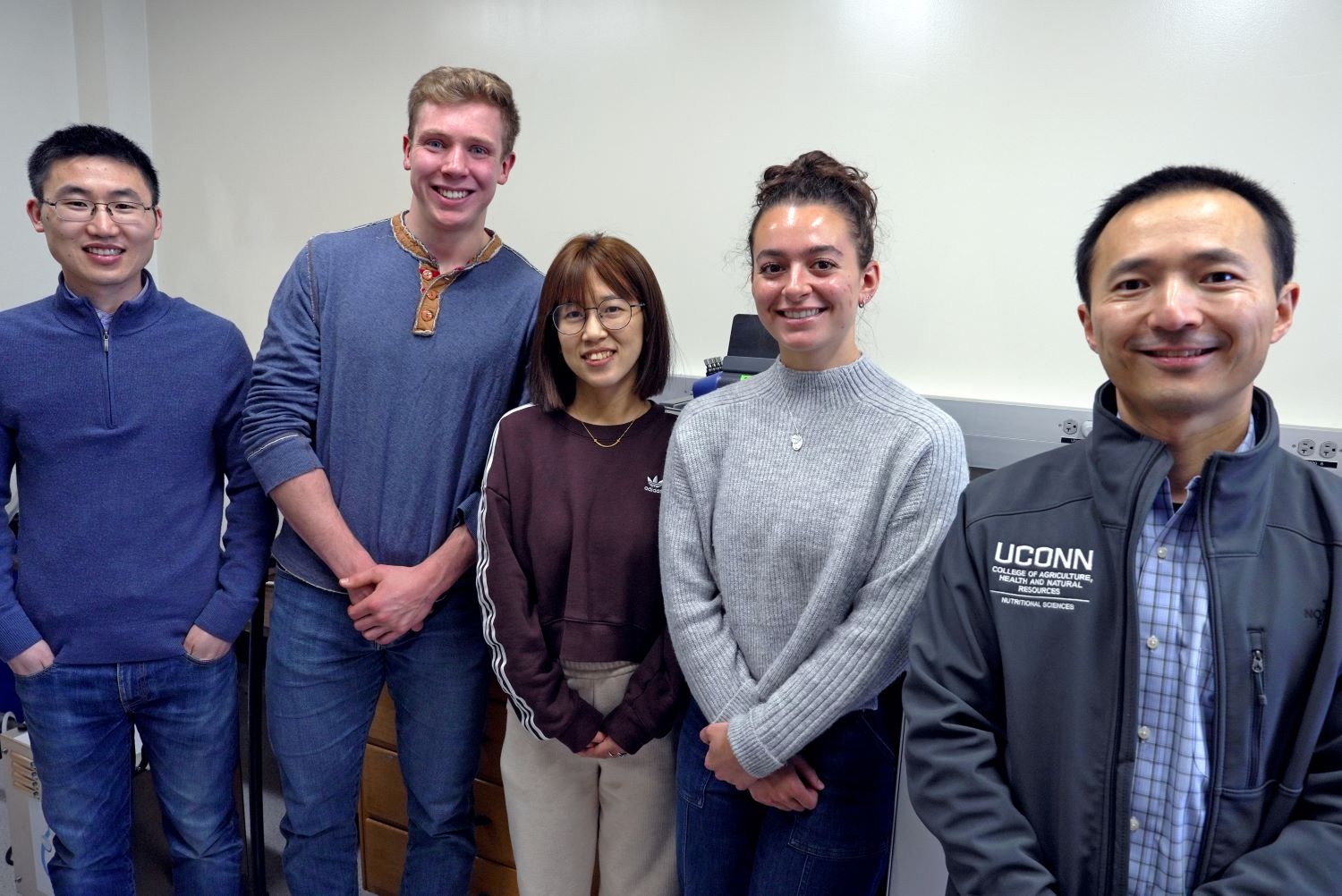The interdisciplinary teams will develop sustainable, algae-based products for use as a poultry feed supplement and food preservative

Sunni Chen, a member of the Clean Green Feed team working in the Luo lab. (Jason Sheldon/UConn Photo)
UConn students and faculty are taking two teams to the final for the U.S. Department of Energy's AlgaePrize competition.
The interdisciplinary teams will develop sustainable, algae-based products for use as a poultry feed supplement and food preservative.
This is the second ever AlgaePrize competition. The competition encourages diverse groups of students to pursue inventive ideas with commercial potential in the growing space of algae innovation.
Faculty from the Department of Nutritional Sciences in the College of Agriculture, Health and Natural Resources (CAHNR) are advising the two teams. International experts in algae innovation, Mingyu Qiao, assistant professor of innovation and entrepreneurship, and Yangchao Luo, associate professor, are guiding KelBerry and Clean Green Feed, respectively.
The KelBerry project is working to extract polymers from seaweed to create an eco-friendly antimicrobial product that can be sprayed on produce to extend its shelf life and reduce the risk of bacterial infection.
The team will be testing the product on strawberries, one of the most wasted foods in the U.S. Because strawberries have thin, fragile cell walls they are more susceptible to spoilage.
"You can spray it on the strawberries and then you can extend its shelf life, for example, from one to two weeks," Qiao says. "And that way you can reduce food waste and enhance food safety."
The KelBerry team includes team captain Cora Derewonko, an environmental science and sustainability student at Southern Connecticut State University; Gabriel Lee, a biological sciences major; Jon Balyeat, a biomedical engineering major; and Yidan Zhang, a PhD student in nutritional sciences.
The extraction method the team is using does not use harmful chemicals that generate hazardous waste. Instead, they are using physical processes, like ultrasounds, and weak, food-grade acid to extract the compounds.


Luo is overseeing the Clean Green Feed team. This team's project focuses on using microalgae as a platform to produce methionine, an essential amino acid, into poultry feed.
Methionine supports poultry health and is commonly added to chicken feed. However, the only methionine supplements currently available are synthetic, petrochemical based products.
This project seeks to produce the first organic methionine supplement for poultry feed.
"In the future, we hope we can completely remove synthetic methionine," Luo says.
Students will learn how algae produces methionine and then manipulate the growth process to amplify the amount of methionine it produces.
"If we identify the specific pathway of producing methionine by the microalgae then we customize that pathway from the environment to trigger the microalgae to accumulate methionine," Luo says.
The Clean Green Feed team includes team captain Jonathan Schmitt, a nutritional sciences major; Keira Touhey, a pathobiology major; and Sunni Chen, a PhD student in nutritional sciences.
"I am so honored that my team has been selected as a finalist, and I am eager to get deeper into the research this summer," Schmitt says. "It is so exciting that my research as an undergraduate
could have a positive impact on so many people and help to reduce our stress on the environment. UConn has opened my eyes to all the different applications of my major, and I can't wait to keep exploring microalgae and see what changes I can bring about."
Out of 40 teams that entered the competition, UConn's teams are among a set of 15 finalists from across the country.
AlgaePrize emphasizes the inclusion of underrepresented students in research. Several student participants were recruited through the Louis Stokes Alliance for Minority Participation (LSAMP) at UConn.
Both teams will work on their projects throughout the summer and into next year. In April 2025, they will travel to Colorado for the final competition.
This work relates to CAHNR's Strategic Vision area focused on Ensuring a Vibrant and Sustainable Agricultural Industry and Food Supply.






